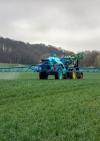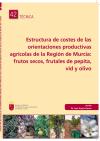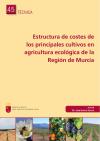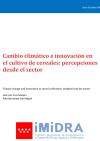Media library
Documentary, graphic and/or audiovisual knowledge objects are offered here, offering information on various sectors and topics. Use the keyword search or search filters to access current audiovisual and documentary knowledge objects useful for your implementation.
If you have any questions or suggestions, please contact us here.

Phytosanitary strategies in tomato
Strategies for the use of phytosanitary products in tomte cultivation

Cost structure of agricultural production areas in the Region of Murcia: stone fruit and citrus fruits
Publication dedicated to the cultivation of regional citrus and stone fruit trees

Cost structure of the agricultural production guidelines of the Region of Murcia: nuts, pome fruit, vines, and olives
Publication dedicated to the most characteristic woody crops of rural Murcia, including nuts, pome fruit, table and wine grapes, and olive trees.

Cost structure of the main crops in organic farming in the Region of Murcia
Document describing the main guidelines for regional organic farming in Murcia

Pyricularia oryzae control strategies in the Calasparra rice plantation. Results obtained from the GO ArrozINNOVA project.
Results obtained in the GO ArrozINNOVA Project

Climate change and innovation in cereal cultivation: perceptions from the sector
Research on the sector's perception of innovation in cereal cultivation due to climate change
Active ingredients allowed in integrated production for pome fruit trees and restrictions on use
Information on active ingredients in integrated production for pome fruit trees and restrictions on use
Active ingredients allowed in integrated production for stone fruit trees and restrictions on use
Information on active ingredients in integrated production for stone fruit trees and restrictions on use
Guidelines for the biological control of the chestnut wasp
Recommendations for the release of Torymus sinensis, a biological control organism for the chestnut wasp
Technical information on the apple snail pest in rice
The Pomacea insularum (apple snail) species is found in Spain. First detected in 2009, it has spread throughout the Ebro Delta. This species is considered one of the 100 most harmful invasive species.
Rosaceae fire blight
Fire blight is a disease caused by the bacterium Erwinia amylovora that affects various species of the Rosaceae family, including pear, apple, quince, Japanese medlar, etc.
Almond wasp
The almond wasp (Eurytoma amigdali E) is a hymenopteran recently discovered in almond orchards in the Valencian Community. The adults are black and emerge in spring from the fruit they parasitized the previous season.
Drosophila suzukii treatment notice for cherry trees
In the various areas where Drosophila suzukii is being monitored, populations of this insect are being detected. Remember that attacks tend to be more intense and frequent at the beginning of the harvest, and treatment will be especially necessary in plots that were attacked in previous years and that left cherries unharvested last year (fly damage or cracking, lack of profitability, etc.).
Notice of treatment of plum moth (Cydia funebrana) in plum trees
The second generation of the plum moth has been seen flying between late May and early June in the Ribera and Val d'Albaida regions, and somewhat later in inland areas. Eggs will hatch this week and next. Treat accordingly.
National contingency plan Pomacea maculata (= P. insularum) (apple snail)
This document sets out the measures to be taken against gastropod mollusc species of the genus Pomacea, a quarantine pest in Europe, with the aim of preventing their appearance and, if they do appear, acting quickly and effectively, determining their distribution and combating them with the aim of eradicating them.
Scirtothrips aurantii, information note and management recommendations, damage caused by thrips in citrus, persimmon and pomegranate.
Given the damage caused by thrips observed since May on leaves and fruit in various citrus, persimmon and pomegranate crops and the confirmation of the presence of Scirtothrips aurantii Faure in certain areas, the following recommendations have been considered appropriate:
Phytosanitary bulletin of notices and information
Pollinating insects are vitally important for the proper functioning of crops. Pollination is essential to ensuring the quantity and quality of crops and food production, directly linking wild ecosystems with agricultural production systems.
Plant health, pest reports: Erwinia amylovora (fire blight)
Fire blight is a disease caused by the bacterium Erwinia amylovora that affects various species of the Rosaceae family, including pear, apple, quince, and Japanese medlar trees. It was detected in Cantabria in 2011 and is considered an extremely harmful disease.




